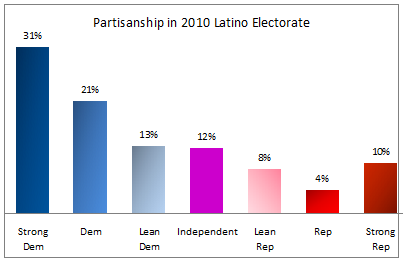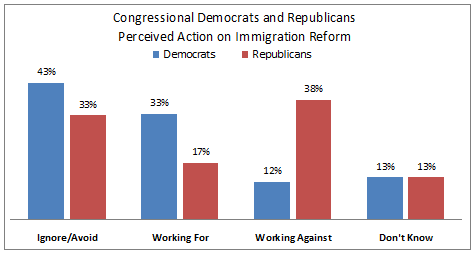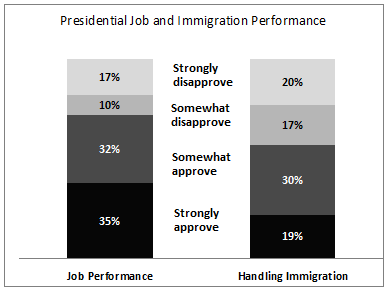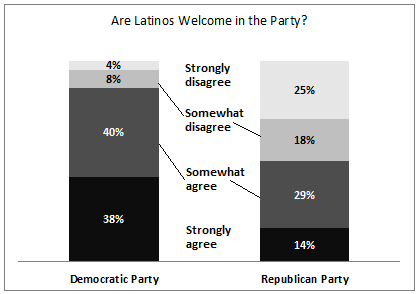Whether Latino voter turnout is high or low, their influence will register in the 2010 midterms because this time, attention is squarely focused on whether they vote, rather than for whom they vote. It is all but a foregone conclusion that the vast majority of Latino voters will support Democrats. After years of escalating and egregious political scapegoating, few Latinos consider the GOP a viable option. Sharp evidence of this very point emerged in Nevada where Republican operatives launched a campaign encouraging Latinos not to vote. Republican strategists decided they would rather invest $80,000 to suppress Latino votes instead of winning them. Tens of thousands of dollars spent to make sure Spanish speaking Latinos (Univision audience) especially see the “keep out” sign and know their votes are not wanted. Interestingly, the “Latinos Don’t Vote” effort surfaced despite well-reported predictions for depressed Latino turnout rates relative to November 2008. Republicans and Democrats have a stake in Latino participatory decisions; their influence can manifest in various ways and is now a permanent part of the electoral environment. As others here have noted the Latino electorate is best poised to defy low expectations in competitive races, some including co-ethnics are on the ballot. This election cycle presents a unique opportunity for the Latino electorate to hold parties accountable for responsiveness, inaction or antipathy to group-specific issues and priorities. During the 2008 election season, Democrats courted Latino voters with specific commitments on immigration reform legislation. Republicans also made an issue of immigration, but did so in a manner that repelled the Latino electorate.

Allies without Outcomes
Latinos bear the brunt of punitive immigration policies and related hostile discourse; it is feasible that those refraining from voting may associate both parties with these unpleasant realities in contemporary Latino American life. Respondents in the current LD tracking poll, that includes a representative sample of the national Latino electorate shows only 14% identify as Republican. Conversely, 52% identify as Democrats and that figure jumps to 65% if we include Democratic-leaning independents. In this respect, Democrats run against themselves and their own record when vying for Latino votes in many parts of the country. Partisan orientation and positions on several group-specific issues (e.g. comprehensive reform, Dream Act, anti-SB1070, language policies) advantages Democrats, but failure to act on these could pose serious disadvantage.

Partisan elites may not realize that the majority of Latino voters, 67%, are unconvinced that Democrats are active legislative advocates on immigration policy, as noted in the October 18 tracking poll. 54% of respondents think Congressional Democrats purposefully avoid or block immigration reform legislation, and another 13% did not know what the party is doing on the issue. Not surprisingly, the figures skew higher for Congressional Republicans, where 71% of Latino voters think the GOP is actively avoiding or working against such legislation. The difference here of course is that there is no expectation that the GOP will represent Latino interests on this, or other issues.

The disjuncture between immigration politics and partisanship is evident in presidential evaluations as well. Latinos still side with the president they helped elect, but are more skeptical of his effectiveness on immigration. President Obama remains popular among Latinos where 67% approve of his performance and only 27% voice disapproval. This is a significant departure from national trends, where his approval rating is much, much lower. Support for Obama’s performance on immigration policy is less enthusiastic, where only 49% of Latinos in the country approve of his handling on the issue – 18 points lower than his overall approval.

A February 2010 study found different racial groups and party identifiers agree that the Democratic party is significantly more welcoming to Latinos than the Republican party. The recent $80,000 GOP investment in the “Latinos don’t vote” effort confirms these perceptions have merit. Perceptions also hold that Latinos are less welcome within both parties, relative to whites. Three weeks ago Latinos were asked again about their sense of party affect toward co-ethnics; perceptions largely remain intact. Among registered voters, 38% strongly agree that Democrats welcome Latinos; only 14% say the same for Republicans. The GOP remains estranged from many Latino voters: 43% of the national Latino electorate feel somewhat to strongly unwelcome by the GOP. 40% of Latinos find Democrats somewhat welcoming, which may not be enough to inspire high levels of turnout or partisan loyalty. Democrats do not seem to have capitalized on Republican weaknesses to cultivate favor with Latinos, their 2008 firewall maybe their most obvious untapped resource, especially as unwelcoming signals from Republicans escalate.
Side Effects May Include Loss of Appetite
Arizona SB1070 reignited Latino’s sense of urgency for immigration reform in a manner reminiscent of Spring 2006. The scope of anti-Latino policy in the state expanded to penalize Latino cultural differences independent of citizenship status (Spanish accents and cultural curriculum), further mobilizing Latino political identity. Around the country, Latinos responded to the Arizona agenda with boycotts, marches and calls for a federal injunction. Republicans mostly rallied behind SB1070 et al. and used the policy agenda to cultivate support among Tea Party activists leading into the 2010 midterm election. Democrats were quick to condemn, but slower to respond to their party’s vocal element. Attorney General Holder and Department of Homeland Security Secretary Napolitano went before Congressional committees to condemn the bill but admitted they had not read it. Days after 1070 was signed, President Obama noted Congress was unlikely to initiate immigration legislation, as “there might not be appetite to dive into another controversial issue”. Latino voters may have lost their appetite too.
Latinos increasingly want to vote, participation rates have slowly but steadily increased over several election cycles. Enthusiasm and long-term loyalty will require more than bold policy statements, political empathy and late hour GOTV efforts from Democrats. The GOP, should they be interested, would need a comprehensive strategic effort to de-horn the devil of a problem they have created. For now, expect the vast majority of Latinos to continue holding them accountable for their antagonism by refusing to support their candidates or adopt a Republican partisan identification. Latino influence may look different this round of elections than it has recent years (characterized by small but overall net gains in presidential and midterm elections), but electoral rewards for advocates and “firing” poor representatives are equally valid measures of influence. Voting is a buyers’ market after all, and no one wants to be harassed or ignored when shopping for an important purchase.
Sylvia Manzano is an Assistant Professor of Political Science at Texas A&M University

